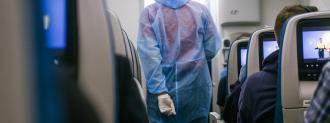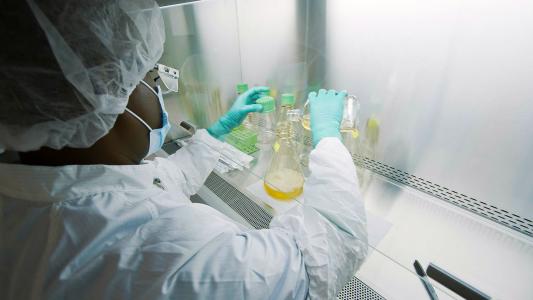Air travel plummeted in March as many would-be passengers decided against flying in the midst of a global pandemic.
Less than two months later, the number of travelers began to creep back up, but is it safe to fly right now? Or are the people opting to travel during the pandemic playing fast and loose with their health?
Air Travel During the Pandemic
The coronavirus spreads mainly from person to person, usually when they’re within six feet of one another — especially indoors. Given that, airplanes seem like they would be hotbeds for transmission: during a flight, people are packed elbow-to-elbow with one another for potentially hours.
Is it safe to fly right now? Depends on your definition of “safe.”
But a global database of over 1,400 superspreader events has found zero major outbreaks onboard aircraft — unlike cruise ships, prisons, and other confined indoor places. Given the importance of super-spreading events, this suggests planes are not the viral hotboxes you might suspect.
MIT professor Arnold Barnett did the math, and it turns out, your risk of catching COVID-19 from air travel during the pandemic isn’t all that high.
For his study, available on the preprint server medRXiv, Barnett calculated the likelihood of a person catching COVID-19 during a two-hour U.S. domestic flight under two scenarios: with every seat in coach filled and with the middle seats left vacant.
Taking into account several variables — the chances of a passenger on the plane having COVID-19, the protection provided by masks, the circulation pattern of air on planes, etc. — Barnett concluded that the risk of catching COVID-19 on a full plane is 1 in 4,300.
That means for every 4,300 people who board full flight, just one will catch COVID-19, on average. On a plane with empty middle seats, the risk drops to one infection for every 7,700 passengers flying during the coronavirus pandemic.
Barnett also calculated the risk of dying from COVID-19 contracted on an airplane and determined that it’s somewhere between 1 in 400,000 and 1 in 600,000. That’s about the same as the risk of contracting a fatal infection through two hours of everyday activities on the ground, Barnett wrote.
So, Is It Safe to Fly?
Whether you hear those numbers and decide that air travel during the pandemic is “safe” really depends on your level of risk aversion. You’re safer at home than you are on a plane, but for some, the rewards of flying might outweigh the dangers.
Before deciding to book a ticket, though, It’s important to consider that Barnett only calculated the risk of catching COVID-19 on a plane.
Prior to settling into your seat — middle or otherwise — you’re going to need to navigate an airport where you’re likely to come in contact with more people than you will on your flight.
I would fly only if it was extremely necessary.
Daniel Fagbuyi
There are ways to minimize your risk of catching COVID-19 at the airport — checking in online, washing your hands regularly, and avoiding the bins at security can all help — but some experts still suggest avoiding air travel during the pandemic if at all possible.
“I would fly only if it was extremely necessary,” Daniel Fagbuyi, a biodefense and public health expert, told the Boston Globe. “If I did fly, you best believe I’m coming with my alcohol sanitizer, disinfectant for my seat and surfaces, gloves, goggles, and N95 mask, but that’s me. It’s all about risk tolerance and protecting one another.”
Barnett, too, told Bloomberg that he isn’t flying anywhere right now because he’s in his 70s and that puts him at greater risk.
We’d love to hear from you! If you have a comment about this article or if you have a tip for a future Freethink story, please email us at [email protected].






